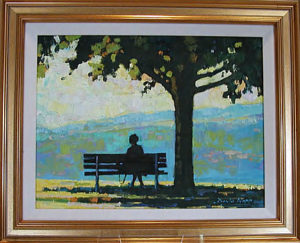Last Saturday morning, while visiting the Bay Area, my husband and I were walking in a seaside park dedicated to the memory of the farm labor organizer, Cesar Chavez. As we walked the weather gave a clear demonstration of the micro-climates of the bay area; one moment we’re bundling up our jackets against the sea breezes and the next, as we round the bend inland, we unbutton our jackets, and think about taking them off entirely to wrap them around our waists.

Walking alongside the bay, I began stopping at benches placed every dozen feet or so, in order to read the inscriptions on small rectangular plaques fastened to the back of each of them. The benches are a great gift to the community, providing a welcomed opportunity for people to view the water as they rest or meditate, or hold a conversation with a friend. As I learned from my reading, each bench was given in memory of someone; a neighbor, a councilman, a family member or friend. I noted that many, perhaps most, of the birth dates were later than my own.
I guess it was the plaques and memorials that got me thinking about the grieving process, a process that my family and I have been engaged in quite frequently the last fifteen years or so. As we walked, and stopped to notice and ask about the dogs running in the free dog zone, without their leashes, I thought about the legacy lessons that each of our families left to us. What did they demonstrated when faced with the loss of a loved one? And how has that influenced our own processes, for good or ill?

I had two rather opposite role models in my family. My mother’s reaction to her youngest son, (my brother’s) disappearance and the eventual confirmation of his death at age 26, was devastation. She did not survive well or long, having a heart attack six months after his funeral. Years of ill health followed until she died of pancreatic cancer at age 70. After my brother’s death, my father, who had been orphaned at the age of 5, became determined to not waste a moment of whatever life he would be given moving forward. He lived a full and vital life until he died at 87.

Rich’s family had trouble accepting death as a part of life. His mother would tease about what a lousy system it was. “You’re born, you work hard, you get sick, and then you die.” His father told and retold the story of being 21 years old when his father died of complications from an elective surgery. “When I walked out of that hospital after learning of my father’s death I saw a bum on the street and I thought, ‘What kind of God would take my father, who had everything to live for, and let this bum, you has nothing to live for, live. “ He never found the answer to this question. Perhaps if he’d donated a bench to a park in memory of his father, he would have had a way to honor him and a way for the sea breezes to comfort him in his grief.

